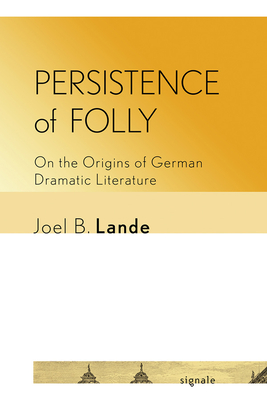

 Cornell University Press and Cornell University Library
Cornell University Press and Cornell University Library
Persistence of Folly: On the Origins of German Dramatic Literature


Key Metrics
- Joel B Lande
- Cornell University Press and Cornell University Library
- Paperback
- 9781501727115
- 8.9 X 5.9 X 1 inches
- 1.2 pounds
- Literary Criticism > European - German
- English
 Secure Transaction
Secure TransactionBook Description
Joel B. Lande's Persistence of Folly challenges the accepted account of the origins of German theater by focusing on the misunderstood figure of the fool, whose spontaneous and impish jest captivated audiences, critics, and playwrights from the late sixteenth through the early nineteenth century. Lande radically expands the scope of literary historical inquiry, showing that the fool was not a distraction from attempts to establish a serious dramatic tradition in the German language. Instead, the fool was both a fixture on the stage and a nearly ubiquitous theme in an array of literary critical, governmental, moral-philosophical, and medical discourses, figuring centrally in broad-based efforts to assign laughter a proper time, place, and proportion in society.
Persistence of Folly reveals the fool as a cornerstone of the dynamic process that culminated in the works of Lessing, Goethe, and Kleist. By reorienting the history of German theater, Lande's work conclusively shows that the highpoint of German literature around 1800 did not eliminate irreverent jest in the name of serious drama, but instead developed highly refined techniques for integrating the comic tradition of the stage fool.
Author Bio
After receiving his PhD at the University of Chicago, Lande was awarded a fellowship by the Princeton University Society of Fellows in the Liberal Arts. Since July 2014, he has been Assistant Professor in the German Department. Over the years, Lande has spent extensive time at European universities, including the Universität Konstanz, Universität Basel, and the Humboldt Universität in Berlin.
In addition to the study of eighteenth- and early-nineteenth century German literature, especially drama, Lande’s interests and competencies reach into other areas of European literature, especially classical antiquity and its various receptions. He maintains an active interest in the German philosophical tradition from Leibniz to Wittgenstein as well as its contemporary Anglo-American and European interpretation. Broadly speaking, his work concentrates the relationship between literary form and transformations in other spheres of knowledge between the seventeenth and nineteenth centuries.
Lande is the author of Persistence of Folly: On the Origins of German Dramatic Literature appeared in Fall 2018 in the Signale Series published by Cornell. This study argues that the figure of the fool played a constitutive role in the emergence of a dramatic literature in the German language. The book uncovers the dramaturgical logic underlying the fool’s appearance in plays from across the seventeenth, eighteenth, and early nineteenth centuries, including texts written by long-forgotten authors as well as major literary works by Lessing, Goethe, and Kleist. In addition, Persistence of Folly argues for the abiding importance of the fool in a wide range of discursive fields, extending from political, moral-philosophical, and medical discussions to treatises on rhetoric and poetry.
A co-edited volume entitled Barocke Figuren: Gestalten der Zeit im Barock appeared in 2013. Together with Jocelyn Holland, he edited the 2019 German Issue of MLN on the topic of anomalies. In addition, he and Denis Feeney are co-editing the collectively written history How Literatures Begin: A Global History (under contract with Princeton University Press). Recent essays on theater history and aesthetics as well as the history of science and early modern political thought have appeared in journals including MLN, the Goethe Yearbook, the Deutsche Vierteljahrsschrift, and the Zeitschrift für deutsche Philologie.
For the academic year 2019–2020 he is on research leave at the Leibniz Zentrum für Literatur- und Kulturforschung as a fellow of the Alexander von Humboldt Foundation.
Source: Princeton University
Videos
No Videos
Community reviews
Write a ReviewNo Community reviews